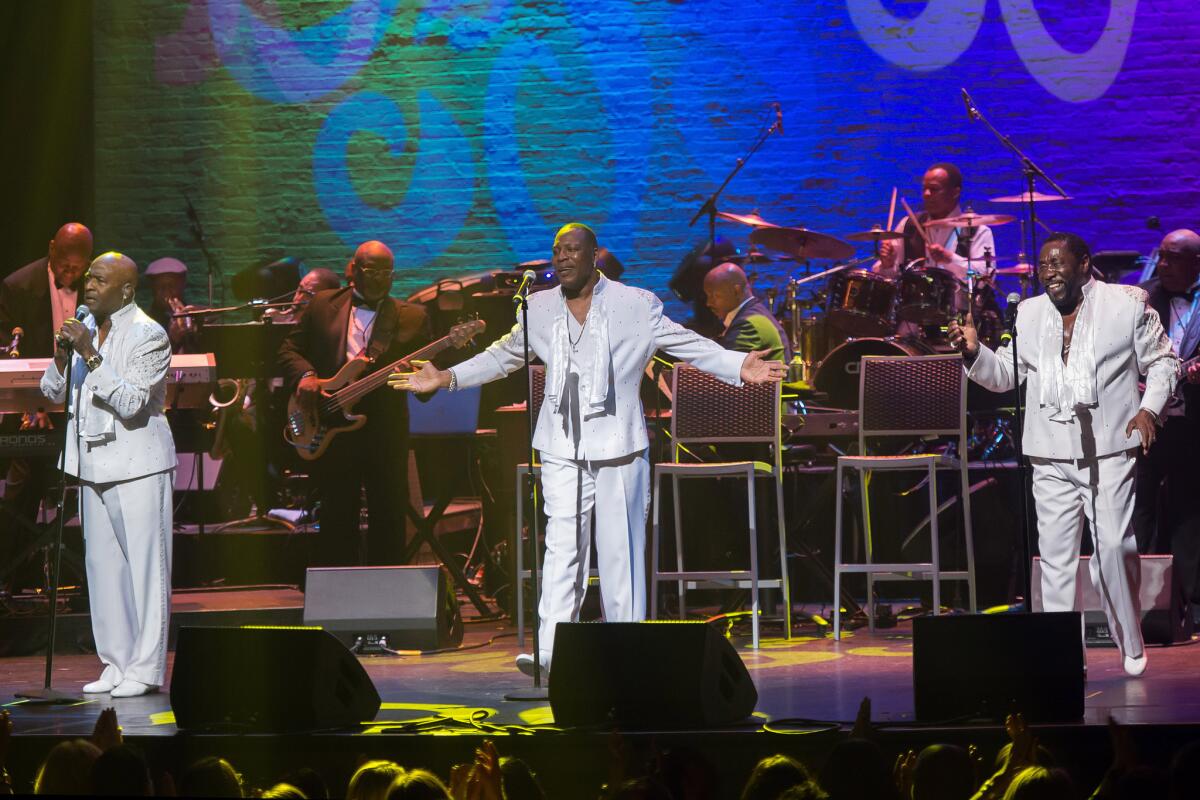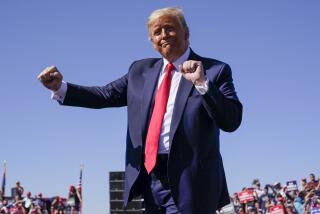The O’Jays sound off against GOP’s ‘unauthorized’ use of their music at Republican convention

- Share via
Two founding members of Rock and Roll Hall of Fame vocal group the O’Jays have joined the expanding list of pop musicians voicing opposition to the use of their music at the Republican National Convention this week in Cleveland.
O’Jays members Walter Williams and Eddie Levert issued a statement Thursday objecting to the use of the 1973 hit “Love Train” without the group’s consent at the convention and over the RNC’s social media outlets, one of which has changed it to “Trump Train.”
“Our music, and most especially, ‘Love Train’ is about bringing people together, not building walls,” said Williams, who has battled multiple sclerosis in recent years. “I don’t appreciate being associated with Mr. Trump and his usage of our music without permission.”
In the same statement, Levert said, “I don’t agree, whatsoever, with Trump’s politics,” adding through a spokesman that he “strongly identifies with the ongoing struggle for civil rights and has been and continues to be, in fact, a friend of many important figures of the civil rights movement.”
Our music, and most especially, ‘Love Train’ is about bringing people together, not building walls.
— Walter Williams
The convention in Cleveland is taking place not far from Canton, Ohio, where the O’Jays formed in 1959.
British rock band Queen and its music publisher, Sony/ATV Music Publishing, voiced disapproval earlier this week of what they deemed “unauthorized” use of Queen’s 1977 hit “We Are the Champions.” That came a day after similar complaints from founding members of the Turtles rock band over the RNC’s playing of that group’s 1967 hit “Happy Together” on opening day of the convention.
Veteran R&B group Earth, Wind & Fire also tweeted the band’s objection to use of the group’s hit song “September” during the convention, issuing a tweet that mirrored the language of Queen’s message to its Twitter followers: “Another unauthorized use at the Republican Convention against our wishes — Earth, Wind & Fire.”
Musicians regularly speak out against uses of their songs at political events when they don’t share the beliefs of politicians who use them and in some cases have won settlements and apologies from those who did so.
But intellectual property litigator Josh Schiller, a partner at New York-based law firm Boies Schiller & Flexner LLP, told The Times this week that he knew of no case that has gone far enough through the court system to establish clear-cut legal precedent for or against such usages.
The issue pits two constitutionally protected rights against each other: the 1st Amendment’s guarantee of freedom of speech, and Article 1, Section 8 provisions in the Constitution protecting intellectual property rights under U.S. Copyright law.
The highest profile case to be adjudicated fully was the 1994 case Campbell v. Acuff-Rose Music, in which pop singer Roy Orbison’s 1964 hit “Oh, Pretty Woman” was sampled without his permission and folded into rap group 2 Live Crew’s song “Pretty Woman.”
The U.S. Supreme Court ruled that 2 Live Crew did not violate the law because its use of Orbison’s song fell under “fair use” provisions of copyright law, in that it was used in parody fashion, usually considered a protected form of speech.
Cases involving political candidates’ use of copyrighted music against the copyright holders’ wishes have not reached appellate court level, Schiller said, because those that have been filed have been settled or withdrawn before reaching that threshold.
“It’s a very interesting question,” Schiller said. “But I will say, I won’t be representing Donald Trump if he goes to court.”
Jackson Browne famously settled his lawsuit against Arizona Sen. John McCain, after McCain’s 2008 presidential bid used Browne’s song “Running on Empty” as a jibe at his Democratic opponent, Barack Obama. That suit ended with payment of an undisclosed amount to Browne, along with an apology from McCain.
TRAIL GUIDE: All the latest news on the 2016 presidential campaign »
Similarly, Talking Heads front man David Byrne sued Florida’s ex-governor Charlie Crist for using his song “Road to Nowhere” without authorization in an ad during Crist’s 2010 senatorial bid against Marco Rubio, resulting in another payment, the amount of which was not disclosed, and an apology from Crist.
Larry Iser, the attorney who represents Browne and Byrne in their lawsuits, said following the “Road to Nowhere” settlement: “This settlement again confirms that the U.S. copyright and trademark laws apply to politicians and their advertising agencies, just like everyone else.”
randy.lewis@latimes.com
Follow @RandyLewis2 on Twitter.com
For Classic Rock coverage, join us on Facebook
ALSO
Queen doesn’t want the GOP to use ‘We Are the Champions,’ but is the law on their side?
Skrillex and Rick Ross deliver an IMAX-sized rap cut for the ‘Suicide Squad’ soundtrack
New Orleans music giant Allen Toussaint saluted in style at Hollywood Bowl
‘The Beatles: Live at the Hollywood Bowl’ album upgraded for Sept. 9 reissue
More to Read
The biggest entertainment stories
Get our big stories about Hollywood, film, television, music, arts, culture and more right in your inbox as soon as they publish.
You may occasionally receive promotional content from the Los Angeles Times.










